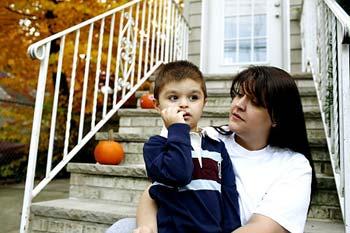Gene variant linked with autism, particularly in boys: study
2009-05-21 10:11 BJT
LOS ANGELES, May 20 (Xinhua) -- U.S. researchers have identified a gene variant which might increase the risk of autism, particularly in boys.
 |
| U.S. researchers have identified a gene variant which might increase the risk of autism, particularly in boys.(File photo) |
Analysis of the DNA of 1,046 members of families with at least two sons affected by autism revealed that a variant of the gene CACNA1G, located on chromosome 17, was consistently associated with autism, according to research findings made public on Wednesday.
This variant of the gene, which helps move calcium between cells, is present in about 40 percent of the population, according to the study appearing online in the journal Molecular Psychiatry.
"This is a strong finding," Stanley Nelson, a professor of human genetics at UCLA's David Geffen School of Medicine, said in a school news release.
"No one has scrutinized the role that CACNA1G plays in autism."
"We found that a common form of the gene occurs more frequently in the DNA of families that have two or more sons affected by autism, but no affected daughters," Nelson said. "Our study may explain why boys are more susceptible to the disorder than girls."
Autism affects boys four times more often than girls.
The researchers did not determine how the CACNA1G variant contributes to autism risk, but Nelson said that it cannot be considered a risk factor on its own.
"This variant is a single piece of the puzzle," he said. "We need a larger sample size to identify all of the genes involved in autism and to solve the whole puzzle of this disease."
Editor: Yang Jie | Source: Xinhua
 Mail
Mail Share
Share Print
Print


 Video
Video









 2009 China Central Television. All Rights Reserved
2009 China Central Television. All Rights Reserved